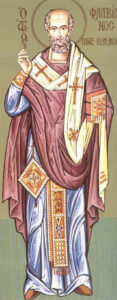Archbishop Flavian I, the Patriarch of Antioch (AD 320 – 404) – Nov. 14

Flavian was born in an affluent, distinguished family in about A.D. 320 in Antioch. His father died, when he was still very young. His father’s death left him heir of considerable property and wealth. He had to look after the immense family property by himself. He inherited great wealth, but he resolved to devote his riches and his talents to the service of the Church. He was deprived of parental control and was exposed to temptations in his youth. He was adorned with wealth and enjoyed highly family status, yet he developed a contempt for luxury and he did not fall into worldly temptations or vices.
His palatial residence became a shelter and hospital for the sick and the suffering. Flavian left his home and spent a life of solitude, as hermit with Diodorus, later bishop of Tarsus. Both supported the Orthodox faith and stood firmly against the heresies of Arius. They lived dangerously in fear; however, they strenuously met the accusations and persecution. However, they were soon recalled from their solitude, to Antioch. As laymen they kept alive an orthodox remnant. They rallied the faithful about them, gathered them to assemble round the tombs of the martyrs, and exhorted them to adhere steadfastly to the faith. Their followers divided themselves into two groups standing around the tombs of martyrs and re-established the antiphonal singing practice introduced by Mar Ignatius. Emperor Leontios endeavoured to check the growing influence but this only increased their popularity and strengthened the cause of Orthodoxy. Flavian and Diodorus became all-powerful at Antioch; Leontios, being unable to resist them, was compelled to retrace his steps.
Patriarch Mar Meletius ordained Flavian priest in A.D. 361. Emperor Valens a strong supporter of Arius settled down in Antioch in A.D. 370. Until his death in A.D. 378, he persecuted the believers of the True Faith. On the death of Patriarch Meletius, Flavian was chosen to succeed him. In 386 Flavian ordained Chrysostom as presbyter. Thus Flavian, Archbishop of Antioch, was a contemporary of Saint John Chrysostom. The rulers in Rome and Egypt refused to acknowledge him as the Patriarch. Through the intervention of John Chrysostom, ‘the Gold Tongued’, soon after his installation as the Patriarch of Constantinople in A.D. 398 and the influence of Emperor Theodosius, Patriarch Flavian was universally acknowledged. He attempted to obtain from the emperor Theodosius (379-395) a pardon for the citizens of Antioch, who had angered the emperor by destroying his statue. He governed the Church of Antioch for 23 years. He left behind certain homilies, of which a few fragments are preserved, on St. John the Baptist, on Easter, and the treachery of Judas. Flavian defended the Nicene Creed against Arianism.
Flavian reposed in the Lord in 404, peacefully. The Orthodox Churches commemorates Mar Flavian who became the twenty-sixth patriarch of Antioch (A.D. 381 – 404) on 14 November and also on 26/27 September
0 Comments